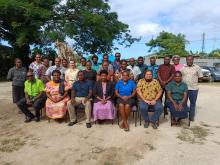An inception meeting on the Management and Conservation of Blue Carbon Ecosystems (MACBLUE) project

Port Vila, Vanuatu: An inception meeting on the Management and Conservation of Blue Carbon Ecosystems (MACBLUE) project took place earlier last week with Vanuatu government and civil society representatives at the Melanesian Hotel in Port Vila, Vanuatu.
Organized by the German Agency for International Cooperation (GIZ) in collaboration with the Vanuatu Department of Environmental Protection and Conservation (DEPC), the workshop was aimed at discussing current policies on management of seagrass and mangrove ecosystems in the country and tailoring the MACBLUE project to respond to national priorities and needs.
In her opening remarks, Ministry of Climate Change Adaptation, Meteorology, Geo-Hazards, Environment, Energy and Disaster Management Director-General Esline Bule shared that conservation of mangroves and seagrass ecosystems is a priority for the Vanuatu government and called on workshop participants for concerted efforts in its management.
Bule highlighted the opportunity offered by the project to build in-country capacity in mapping and managing coastal ecosystems.
According to the Vanuatu Department of Forestry, there are approximately 3000 hectares of mangrove areas in Vanuatu with 23 different species in three main sites. Presentations during the workshop also revealed 12 seagrass species identified in Vanuatu.
Seagrass and Mangrove provide important ecosystem services such as nursery for juvenile animals, carbon storage and sediments stabilization.
MACBLUE Project Director Raphael Linzatti acknowledged Vanuatu as the first country to conduct its project inception meeting.
“A key outcome of the workshop was the establishment of a national steering committee which will guide the project during its implementation,” he said. “We offer our support to the government in testing management approaches and developing policies for the sustainable management of mangrove and seagrass ecosystems.”
The results of the workshop will feed into the implementation plan of the project going forward.
The MACBLUE project is implemented jointly by the Pacific Community (SPC), the Secretariat of the Pacific Regional Environment Programme (SPREP) and GIZ, on behalf of the German Federal Ministry for the Environment, Nature Conservation, Nuclear Safety and Consumer Protection (BMUV). The project aims to strengthen coastal biodiversity conservation and management through protection and rehabilitation incentives for coastal carbon sinks in Vanuatu, Solomon Islands, Fiji and Papua New Guinea.
The project partners map the extent of seagrass and mangrove ecosystems in close collaboration with the government. Based on this information, the project supports national governments and stakeholders in the assessment and modelling of carbon storage capacity, emission potential and ecosystem services, and test management approaches of both ecosystems.
By GIZ
For further information, please visit macblue-pacific.info
